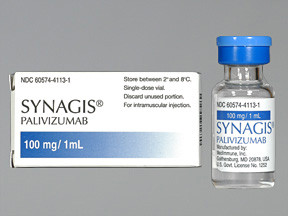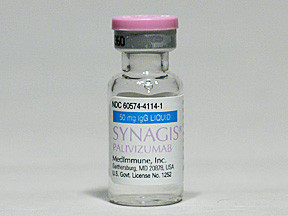PALIVIZUMAB - INJECTION
PHONETIC PRONUNCIATION: (PAL-i-VIZ-ue-mab)
COMMON BRAND NAME(S): Synagis
GENERIC NAME(S): palivizumab
Uses
USES: Palivizumab is used in certain infants and young children to prevent serious lung infections (such as pneumonia) that are caused by a certain virus (respiratory syncytial virus-RSV). Palivizumab works by preventing the growth of the virus. This medication is not used to treat RSV infection, but should be continued even if your child gets the RSV infection to prevent a more serious infection.
How to use PALIVIZUMAB - INJECTION
HOW TO USE: Read the Patient Information Leaflet if available from your health care professional before your child starts receiving palivizumab and before each injection. If you have any questions, ask your doctor or pharmacist. This medication is given into a muscle (usually the thigh) by a health care professional as directed by your child's doctor, usually once a month during RSV season. RSV season in the northern hemisphere usually starts in November and runs through April. The dosage is based on your child's weight. Your child should receive this medication regularly to get the most benefit from it. To help you remember, mark the days on a calendar when your child should receive the medication.
Side Effects
Precautions
Interactions
Overdose
Images
Reviews
Faq for PALIVIZUMAB - INJECTION
- Palivizumab injection is used to prevent severe respiratory syncytial virus (RSV) infections in infants and young children at high risk.
- Palivizumab is a monoclonal antibody that works by targeting and neutralizing the RSV virus, reducing the chances of severe infection.
- Palivizumab injections are typically given once a month during the RSV season, which usually lasts from November to April. The total number of injections will depend on the individual's risk factors.
- Infants born prematurely (before 29 weeks of gestation) and certain babies with chronic lung conditions, heart diseases or other high-risk factors are eligible for Palivizumab.
- The common side effects of Palivizumab injection include fever, rash, injection site reactions, runny or stuffy nose, and sore throat. Severe allergic reactions are rare but possible.
- The half-life of Palivizumab is approximately 20 days, but it is recommended to follow the prescribed dosing schedule to ensure continuous protection.
- No, Palivizumab is only approved for use in infants and young children at high risk of severe RSV infections. It is not recommended for use in older children or adults.
- No, Palivizumab is not a vaccine. It is a monoclonal antibody that provides passive immunity to RSV. Vaccines for RSV are currently under development.
- Palivizumab has been shown to reduce the severity of RSV infections in high-risk infants by approximately 55%, lowering the hospitalization rates related to RSV.
Disclaimer
IMPORTANT: HOW TO USE THIS INFORMATION: This is a summary and does NOT have all possible information about this product. This information does not assure that this product is safe, effective, or appropriate for you. This information is not individual medical advice and does not substitute for the advice of your health care professional. Always ask your health care professional for complete information about this product and your specific health needs.


No Reviews Yet